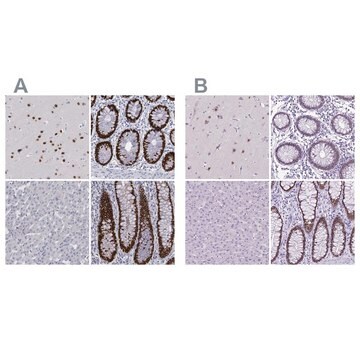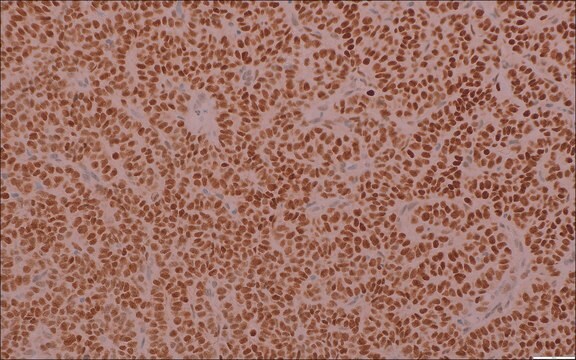おすすめの製品
由来生物
rabbit
品質水準
100
500
結合体
unconjugated
抗体製品の状態
culture supernatant
抗体製品タイプ
primary antibodies
クローン
SP92, monoclonal
詳細
For In Vitro Diagnostic Use in Select Regions (See Chart)
フォーム
buffered aqueous solution
交差性
human
包装
vial of 0.1 mL concentrate (294R-14)
vial of 0.5 mL concentrate (294R-15)
bottle of 1.0 mL predilute (294R-17)
vial of 1.0 mL concentrate (294R-16)
bottle of 7.0 mL predilute (294R-18)
メーカー/製品名
Cell Marque®
テクニック
immunohistochemistry (formalin-fixed, paraffin-embedded sections): 1:100-1:500
アイソタイプ
IgG1
コントロール
B-cell lymphoma, tonsil
輸送温度
wet ice
保管温度
2-8°C
視覚化
nuclear
遺伝子情報
human ... POU2AF1(5450)
詳細
Expression of BOB.1/OBF.1 is restricted largely to mature B-cells. Germinal center B-cells normally demonstrate strong staining for BOB.1, as do mantle-zone B-cells, and plasma cells. Analyses of BOB.1/OBF.1 expression in a variety of established B-cell lines representing different stages of B-cell development has suggested a constitutive, B-cell-specific expression pattern. Because they are germinal center derived, L&H cells in nodular lymphocyte predominant Hodgkin lymphoma are consistenty immunoreactive for BOB.1. Conversely, the Hodgkin/Reed- Sternberg cells in classical Hodgkin lymphoma either do not express both (80%) or express only one (20%) of the two proteins. In B-cell lymphomas, the highest expression levels for BOB.1/OBF.1 are reported in follicular center lymphomas, diffuse large B-cell lymphomas and Burkitt lymphomas.B-CLL, MALT-type, and mantle cell lymphomas score negative or display an heterogenous/weaker reactivity.10-11 Studies have suggested that anti-BOB. has a high predictive value in discriminating primary mediastinal B-cell lymphoma from classical Hodgkin disease.Approximately 50% of acute myeloid leukemias express BOB.1.
関連事項
BOB.1 Positive Control Slides, Product No. 294S, are available for immunohistochemistry (formalin-fixed, paraffin-embedded sections).
物理的形状
Solution in Tris Buffer, pH 7.3-7.7, with 1% BSA and <0.1% Sodium Azide
調製ノート
Download the IFU specific to your product lot and formatNote: This requires a keycode which can be found on your packaging or product label.
その他情報
For Technical Service please contact: 800-665-7284 or email: service@cellmarque.com
法的情報
Cell Marque is a registered trademark of Merck KGaA, Darmstadt, Germany
適切な製品が見つかりませんか。
製品選択ツール.をお試しください
最新バージョンのいずれかを選択してください:
試験成績書(COA)
Lot/Batch Number
Ana-Isabel Sáez et al.
Modern pathology : an official journal of the United States and Canadian Academy of Pathology, Inc, 15(3), 211-220 (2002-03-21)
Oct1 and Oct2 are transcription factors of the POU homeo-domain family that bind to the Ig gene octamer sites, regulating B-cell-specific genes. The function of these transcription factors is dependent on the activity of B-cell-restricted coactivators such as BOB.1/OBF.1. Independent
H Stein et al.
Blood, 97(2), 496-501 (2001-01-12)
In contrast to the tumor cells (L&H cells) of lymphocyte predominant Hodgkin disease (LPHD), Hodgkin and Reed-Sternberg (HRS) cells of classical Hodgkin disease (cHD) are unable to transcribe immunoglobulin, despite the presence of rearranged immunoglobulin genes. Although initial studies have
Christina B Hertel et al.
Oncogene, 21(32), 4908-4920 (2002-07-16)
In classical Hodgkin lymphoma the malignant Hodgkin/Reed-Sternberg (HRS) cells characteristically constitute only a small minority of the tumour load. Their origin has been debated for decades, but on the basis of rearrangement and somatic hypermutations of their immunoglubulin (Ig) genes
Diagnostic Immunohistochemistry: Theranostic and Genomic Applications (2006)
Susanne Annette Steimle-Grauer et al.
Virchows Archiv : an international journal of pathology, 442(3), 284-293 (2003-03-21)
The World Health Organization (WHO) classification of Hodgkin lymphoma (HL) distinguishes two types: Classical Hodgkin lymphoma (CHL) and nodular lymphocyte predominant Hodgkin lymphoma (NLPHL). Both groups have in common that they mostly derive from B cells with rare classical cases
ライフサイエンス、有機合成、材料科学、クロマトグラフィー、分析など、あらゆる分野の研究に経験のあるメンバーがおります。.
製品に関するお問い合わせはこちら(テクニカルサービス)


